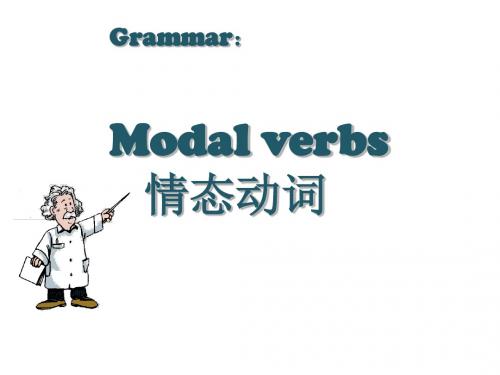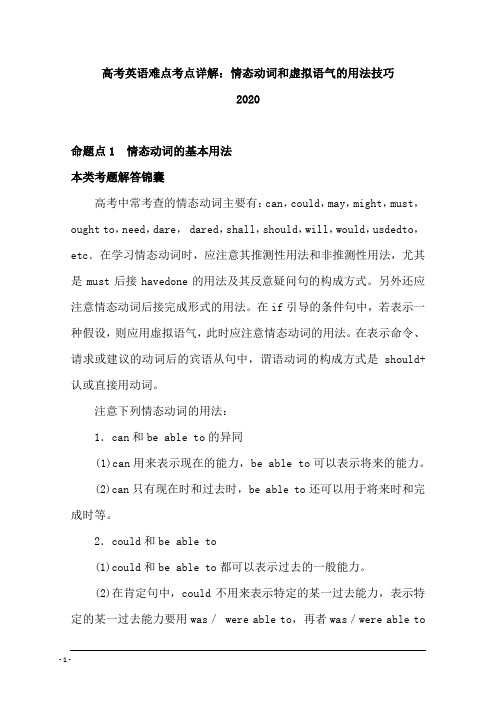军考大纲解读——军校考试大纲[最新版]英语考点27:情态动词的用法
(带答案)高考英语词法之情态动词考点笔记总结

(带答案)高考英语词法之情态动词考点笔记总结单选题1、“The interest be divided into five parts, according to the agreement made by both sides,” declared the judge.A.mayB.canC.mustD.shall2、New regulations make it clear that to use children's information, network operators ______ obtain the children's guardians' permission in a clear mannerA.mayB.shallC.couldD.might3、—May I smoke here?—If you _______, choose a seat in the smoking section.A.mustB.shouldC.mayD.can4、You ______ feel all the training a waste of time, but I'm a hundred percent sure later you'll be grateful you did it. A.mayB.canC.shouldD.would5、During my first year abroad, I was so busy studying and meeting new people that I did not phone my parents as often as I ________.A.shouldB.wouldC.should haveD.would have6、Professor Smith, many students want to see you. ________ they wait here or outside? A.DoB.WillC.ShallD.Would7、—Must we hand in our homework now?—No, you_____. You may give it to me tomorrow.A.needn’tB.mustn’tC.can’tD.shouldn’t8、--- Few of the students passed the maths quiz this time in our school.---Really? It ________ difficult.A.should beB.might beC.must have beenD.could have been..9、My computer start this morning. There must have been something wrong with it. A.shouldn'tB.wouldn'tC.needn'tD.mustn't10、---You ________ here all the way through the thick snow last night .There was nothing important. ---Yes, but I didn’t know.A.didn’t need to comeB.don’t need to comeC.needn’t have comeD.needn’t come11、Mr. Smith is almost on time for everything. How ________ it be that he was late for the meeting? A.canB.shouldC.mayD.must12、—Would you like to go swimming with me this afternoon?—I’d love to. But I’ m afraid I________. I have too much work to do.A.can’tB.mustn’tC.needn’tD.may not13、He ______ be in the house. Look, that is his car!A.canB.can’tC.mustD.mustn’t14、---Is he in the office now?---No, he __________ be there. I saw him in the library just now.A.won’tB.can’tC.needn’tD.mustn’t15、Could I use your computer for a while?—Of course! You ________.A.mightB.canC.couldD.will16、—Listen ! Helen is singing in the next room.—It be Helen. She has gone to Beijing.A.can’tB.mustn’tC.mayD.should17、If Mike come this evening, I would ask him to help me deal with the problem. A.shouldB.couldC.wouldD.might18、—What’s wrong with the door?—The key has got stuck in it and ______ come out.A.shouldn’tB.mustn’tC.needn’tD.won’t19、Mr. Wang ________ have thought the car was worth the money paid, or he would not have spent so much money on such an expensive sports car.A.couldB.shallC.canD.must20、You ________ be hungry after all that long walking.A.mightB.mustC.couldD.need21、Some women ________ a good salary in a job instead of staying home, but they decided not to work for the sake of their family.A.should makeB.should have madeC.would makeD.could have made22、According to the law in our city, the money _____ be divided between you two. A.willB.shouldC.shallD.need23、Reading a large number of books ________ make us wiser.A.shouldB.canC.needD.must24、-So delicate a gift!Who on earth gave it to you?-It's from my boy friend,if you___________ know.A.shouldB.mustC.wouldD.shall25、―It is reported that the award-winning work of New Concept Composition Competition “Antique” is suspected of copying.―I can’t believe the author ____ such a mistake.A.must have madeB.need have madeC.should have madeD.could have made26、You ________ walk on the wet hill path because you ________ fall and hurt yourself.A.must; might notB.mustn’t; mightC.needn’t; needD.must; must27、Although this ________ sound like a simple task, great care is needed. A.mayB.mustC.needD.should28、“You say you ________ do this, but I say, you ________ do it!” said the boss.A.should not; willB.can not; mayC.will not; shallD.will not; will29、— John graduated from college at a very young age.— Oh, he _________a very smart boy then.A.could have beenB.must have beenC.should beD.might be30、—Excuse me, but I want to use your computer to type a report.—You _____ have my computer if you don’t take care of it.A.shan’tB.might notC.needn’tD.shouldn’t31、—I have watered all the plants in the garden.—Thanks, Tony, but you _____ then. It’s repor ted that there will be a storm tonight.A.couldn’t have wateredB.needn’t have wateredC.could waterD.needn’t water32、—Who’s that person in the street? Is it Mr. Liu?—It ________ be him. Because Mr. Liu is ill in hospital already.A.mustn’tB.can’tC.needn’tD.maybe33、Life is unpredictable; even the richest ______ become the poorest. A.shallB.mustC.needD.might34、—You look so tired. You__________late last night.—Yes, I had to finish an important report last night so I didn't sleep at all.A.could sleepB.should have sleptC.may sleepD.must have slept35、—Look, the boy is crying sadly.—Yes. From my point of view, his mother ________ not have punished him so severely. A.canB.mustC.shouldD.may36、—That important document is nowhere to be seen.—Don't worry! You ___________ it somewhere. Calm down and think it over.A.might leaveB.might have leftC.should leaveD.should have left37、—Is Mr. Smith in?—There isn’t any Mr. Smith here. You____________ the wrong number.A.may have dialedB.might dialC.must have dialedD.could dial38、Sometimes it seems that doors ___________ be closed for you, but remember, they are not all locked.A.mustB.shouldC.mayD.need39、—Let's__________ to the movie!—I am sorry, I must__________ my homework first.A.going; doB.go; doingC.go; doD.going; doing40、No one ____ be more warm-hearted; he has a heart of gold.A.shouldB.canC.mightD.need41、—Mum, where`s my bag?—How________ I know where you have left your bag? A.needB.wouldC.shouldD.might42、You _______ her more help, even though you were really busy.A.might giveB.must have givenC.ought to have givenD.ought to give43、You_______get a new bicycle as a reward for doing well in the following final exam. A.mustB.willC.shallD.should44、—_______ you disturb me now? I’m busy p reparing a report.— Terribly sorry, but I have something urgent to tell you. A.NeedB.ShouldC.MightD.Must45、My sister met him at the cinema yesterday afternoon, so he _________ your lecture. A.couldn't have attendedB.needn't have attendedC.mustn't have attendedD.shouldn't have attended(带答案)高考英语词法之情态动词_01B参考答案1、答案:D解析:考查情态动词。
军考大纲解读——军校考试大纲[最新版]英语考点11:名词所有格
![军考大纲解读——军校考试大纲[最新版]英语考点11:名词所有格](https://img.taocdn.com/s3/m/a4c143b30029bd64783e2c21.png)
军考大纲解读|军校考试大纲[最新版]英语考点11:名词所有格
关键词:军校考试张为臻军校考试试题军校考试培训军校招生政策军考大纲
名词所有格
表示有生命的东西的名词及某些表示时间、距离、星球、世界、国家等无生命的东西的名词后加’s来表示所有关系,叫做名词所有格。
例如:men’s room 男厕所
Chairman Mao’s works 毛主席著作
a mile’s distance 一英里的距离
a stone’s throw 一步之遥
the moon’s light 月光
但如果该名词是以-s或-es结尾,则只在该名词后加“’”来构成所有格。
张为臻博客例如:3 hours’ walk 三小时的路程
five minutes’ walk 五分钟路程
two miles’ distance 两英里的距离。
情态动词语法讲解PPT课件

2表示“许可”和“不许”
a)请求对方“许可”可用can, could, may, might.
may/might较正式,could/might较委婉
表示给予“许可”通常用can/may,而不用 could/might
Could I use your phone? Yes, of course you can. Might I trouble you for a light? You may indeed.
表示将来的“必须”,常用have to的一定 形式(will/shall have to) 比较:
•We must do it again.(表示现在)
•We’ll have to do it again.(表示将来)
•表示过去的“必须”,常用had to
•I had to leave at six yesterday.
•They must be home by now.(他们现在一定到家了)
will/would表示“推测”可有三种情况
1)对特定事态的推测
A: Who’s that man over there? B: That will be George, no doubt. C: That would be George, I except.
• Can they have missed the bus?
• Yes, they may have.
may not重音落在助动词上,表示 “不可能”,重音落在否定词上,表 示“不许可” , 比较:
•He may not go tomorrow.
•He may not go tomorrow.
•所以在书面语中,表示“不可能” 常用can’t
专题07 情态动词和虚拟语气(讲义)(原卷版)

专题07 情态动词和虚拟语气(讲义)目录考点情态动词和虚拟语气---------------------------------------------------------------------------------------------------------1页---------------------------------------------------------------------------=------------------------------------------1页------------------------------------------------------------------------------------------------------------------------2页【真题研析·规律探寻】-----------------------------------------------------------------------------------------------------2页考向1考查情态动词的基本用法----------------------------------------------------------------------------------------------------------------2页考向2考查情态动词的基本含义及用法--------------------------------------------------------------------------------------------------------2页考向3考查虚拟语气中----------------------------------------------------------------------------------------------------------------------------3页【核心提炼·考向探究】----------------------------------------------------------------------------------------------------3页1.情态动词的基本用法----------------------------------------------------------------------------------3页2.情态动词后跟完成式的用法----------------------------------------------------------------------------7页3.虚拟语气的常用用法-------------------------------------------------------------------------------------------------------------------------------------7页【题型特训·命题预测】-------------------------------------------------------------------------------------------------------------7页预测考向1 考查情态动词的基本用法----------------------------------------------------------------------------------------------------------------8页预测考向2 考查情态动词+完成式的用法-----------------------------------------------------------------------------------------------------------8页预测考向3 考查虚拟语气--------------------------------------------------------------------------------------------------------------------------------8页考点情态动词和虚拟语气考情分析:分析2021-2023年新高考有关情态动词和虚拟语气的考向分布。
【免费】高考英语难点考点详解:情态动词和虚拟语气的用法技巧

高考英语难点考点详解:情态动词和虚拟语气的用法技巧2020命题点1 情态动词的基本用法本类考题解答锦囊高考中常考查的情态动词主要有:can,could,may,might,must,ought to,need,dare, dared,shall,should,will,would,usdedto,etc.在学习情态动词时,应注意其推测性用法和非推测性用法,尤其是must后接havedone的用法及其反意疑问句的构成方式。
另外还应注意情态动词后接完成形式的用法。
在if引导的条件句中,若表示一种假设,则应用虚拟语气,此时应注意情态动词的用法。
在表示命令、请求或建议的动词后的宾语从句中,谓语动词的构成方式是should+认或直接用动词。
注意下列情态动词的用法:1.can和be able to的异同(1)can用来表示现在的能力,be able to可以表示将来的能力。
(2)can只有现在时和过去时,be able to还可以用于将来时和完成时等。
2.could和be able to(1)could和be able to都可以表示过去的一般能力。
(2)在肯定句中,could不用来表示特定的某一过去能力,表示特定的某一过去能力要用was/ were able to,再者was/were able to含有“经过努力做到”的意思,但在否定句中,could不受这一限制。
3.can,could和may,might(1)表示“许可”“请求”。
can,Could在口语中表示请求、允许,侧重客观情况;may,might在肯定句中表示允许,在疑问句中表示请求,侧重说话人给予的“许可”;may表示“许可”时的否定式为mustn’t.(2)表示“可能”。
can(现在式),Could(过去式)表示潜在的可能性,用于否定句和疑问句中; may(现在式),might(过去式)表示客观可能性,通常用于肯定句和否定句中。
(3)can和Could在疑问句、否定句、感叹句中表示猜测、怀疑;may和might在肯定句中表示怀疑、猜测;表示猜测时,could和might 不表示过去,而表示更不肯定。
高考英语新情态动词知识点

高考英语新情态动词知识点在高考英语中,情态动词一直是一个重要的语法知识点。
近年来,对于新情态动词的考查也逐渐增多。
新情态动词包括 ought to、have to、be supposed to 等,它们在用法和语义上都有其独特之处。
首先,我们来看看 ought to。
ought to 表示“应该”,语气比 should 稍强。
它常用于表示责任、义务或正确的做法。
例如:“You ought to study harder if you want to get good grades”(如果你想取得好成绩,你应该更努力学习。
)需要注意的是,ought to 的否定形式是 ought not to,疑问形式是将 ought 提前。
接着是 have to。
have to 强调由于外部的客观原因而“不得不”做某事。
它有人称、数和时态的变化。
比如:“I have to go now because it's getting late”(我现在得走了,因为天色已晚。
)“She had to stay athome yesterday because she was ill”(她昨天不得不待在家里,因为她生病了。
)与 must 不同,must 通常表示主观上的“必须”,而 have to 更侧重于客观上的无奈。
再来说说 be supposed to。
这个短语有多种含义,常见的有“应该;被期望”。
“You are supposed to arrive on time”(你应该准时到达。
)它还可以表示“本应;本该”,用来表示某事没有按照预期发生。
例如:“The train was supposed to leave at 9 o'clock, but it's delayed”(火车本该 9 点出发,但晚点了。
)在具体的语境中,这些新情态动词的运用需要我们仔细分辨。
比如,在表达建议时,ought to 可能更合适;在强调客观条件限制时,have to 更为准确;而 be supposed to 则在描述期望和规定方面用得较多。
第03讲情态动词和虚拟语气(精讲)2024年高考英语高频考点题型归纳与方法总结(新高考通用)
【一轮复习讲义】2024年高考英语高频考点题型归纳与方法总结(新高考通用)第03讲情态动词和虚拟语气(精讲)题型目录一览考点1、情态动词的用法分考点1. 情态动词的基本用法(1)、can, could①、表示能力,意为“能,会”;could表示过去的能力,不表示是否做。
·●She can speak French fluently. 她能讲一口流利的法语。
●Our daughter could walk when she was nine old. 我们的女儿九个月大时就会走路了。
②、can可用于肯定句中,表示客观或理论上的可能性。
● He is confident a solution can be found. 他确信会找到解决办法。
●An experienced teacher can make mistakes. 一位有经验的老师也会犯错。
③、表示请求或允许。
在疑问句中, could可以代替can,语气更委婉,但回答时要用can。
●---Can/ Could I use your bike tomorrow morning?----Yes, you can.---明天上午我可以用你的自行车吗?----是的,可以。
①、表示可能性,意为“可能”,can多用于否定句和疑问句中,could不受限。
can比could语气强。
●He can't be our manager. Our manager has gone to Beijing..他不可能是我们经理。
我们经理已经去北京了。
⑤、表示惊异、怀疑、迷惑等态度,常用于否定句和疑问句中。
● How can you treat me like that? 你怎么能那样对我?⑥、用于固定习语中:can't....too/ enough(无论…也不过分;越…越好);can' but do sth..(不得不做某事,只好做某事);can' t help doing sth...(禁不住做某事)。
高考英语情态动词用法及解题技巧
高考英语情态动词用法及解题技巧情态动词是中学英语语法的重点,也是高考的热点。
只用作情态动词的有:can/could,may/might,must,oughtto,beableto;既可作情态动词又可作实义动词的有:need,dare;既可作情态动词又为助动词的有:shall/should/w1ll/would。
下面以近几年的高考情态动词试题为依据,探讨高三英语常见情态动词用法及解题技巧。
1情态动词need的用法 1.need作情态动词,一般用于疑问句和否定句中,表示“需要”、“必要”。
当其用于现在时和将来时时,在宾语从句中可当过去时用。
肯定回答用must(或haveto,oughtto,should)来表达。
否定式为neednot/needn’t表示“不必,不需要”。
如:(1)Youneedn’tshowyourpassportattheentranceunlesstheguardasksyouforit.(2)—ShallItellJackaboutit?—No,youneedn’t.I’vetoldhimalready.2.need作实义动词,意为“需要”、“要求”。
如:(1)Youdon’tneedtoleavesoearly.(2) Heneedstotryonemoreexperiment.1情态动词dare的用法 1.情态动词,表示“敢”,后接动词原形,用于否定句、疑问句和条件状语从句中。
如:(1)Wedarenotrefusetheirrequest.(2) Dareyouwalkthroughtheforestatnight?2.当实义动词用时,可用于各种句型中。
dare作实义动词用在否定句和疑问句中时,其后接不定式有时可省去“to”。
如:(1)Doeshedaretocome?(2)Shedarestospeakinfrontofbigaudience.(3) Ihaveneverdared(to)speaktohim.1can/beableto/could用法 1.can和beableto都表示“能力”。
情态动词和虚拟语气
情态动词和虚拟语气一、问:本考点的命题思路是什么?答:情态动词要注意以下3个方面:1、注重在语言环境中根据说话人的语气来使用情态动词。
2、情态动词表示推测或判断的用法考查。
3、设置场景考查学生熟练使用表示责备等的情态动词加完成时的用法等。
虚拟语气是历年高考的选考考点。
考点常集中在含蓄条件句以及宾语从句中的虚拟语气上。
所设选项常通过谓语动词的特殊形式来表示,而且都是结合具体语境来考查对考点的运用能力。
今后高考对虚拟语气的命题重点仍会是在特定语境中考查虚拟语气中的含蓄虚拟条件句、宾语从句中的谓语动词等。
例1:(08上海卷). According to the air traffic rules, you ___ switch off your mobile phone before boarding.A. mayB. canC. wouldD. should【答案】D。
【题源探究】考查should的基本用法。
【广角思维】句意为“根据航空交通法,有在登机前应该把手机关掉。
”should“应该”符合该句语境所以答案为D。
【易误警示】不能准确地把握该提的语境是考生在做该题时出现的主要错误。
做此类试题时一定要通过语境把握准语境体现出来的说话人的语气和态度。
【悟彻高考】should的其中一种重要用法是:should 作为情态动词,通常用来表示现在或将来的责任或义务,译作“应该”、“应当”,这时它可以和ought to,be supposed to 互换使用。
例如:You should (= are supposed to )complete your test in time.你们应该按时做完你们的实验。
You should (= ought to )tell your mother about it at once.【同类预测】对should的这种用法的考查会比较灵活,也比较常见,有时会利用ought to 来考查该用法。
高中英语2025届高考语法复习情态动词与虚拟语气知识讲解
高考英语语法复习情态动词与虚拟语气知识讲解一、情态动词(1)表示能力时,can只用于一般现在时,could仅用于一般过去时;而be able to则有更多的时态,如将来时、完成时等。
I haven’t been able to read that report yet.He will be able to skate as well as you.(2)Was/were able to表示能力时,侧重经过努力而成功做到某事;而could仅表示具备能力,不说明是否实施了能力。
He studied hard and was able to pass the exam.(3)用在其他动词,如might,may,would,want,hope等之后表示能力只能用be able to。
He might be able to fix your car.(1)must还可以表示质问或感情色彩,意为“偏要,偏偏”。
Why must it snow on Saturday?(2)should还可以表示惊奇、愤怒、失望等特殊情感,尤其用在以why,who,how等开头的疑问句中或某些感叹句中。
why should you be so late today?(1)must作“必须”讲的一般疑问句,其肯定回答用must,否定回答用needn’t或don’t have to。
-Must I pay now?-Yes, you must./No, you needn’t.(2)need还可以作实义动词,有人称和数的变化,后跟带to的不定式作宾语。
She needed to go out for a walk.(1)两者在表示过去的习惯动作或行为时常可通用。
When we were children, we would/used to go skating every winter.(2)Used to与would都不能与表示具体频率、次数的词及特定的时间状语或具体的一段时间连用。
- 1、下载文档前请自行甄别文档内容的完整性,平台不提供额外的编辑、内容补充、找答案等附加服务。
- 2、"仅部分预览"的文档,不可在线预览部分如存在完整性等问题,可反馈申请退款(可完整预览的文档不适用该条件!)。
- 3、如文档侵犯您的权益,请联系客服反馈,我们会尽快为您处理(人工客服工作时间:9:00-18:30)。
军考大纲解读——军校考试大纲[最新版]英语考点27:情态动词的用法
关键词:军校考试 张为臻 军校考试试题 军校考试培训 军校招生政策 军考大纲
情态动词的用法
首先它是动词,而且不同于行为动词,行为动词表示的是可以通过行为来表达的动作(如
写,读,跑),而情态动词只是表达的一种想法(如能,也许,敢)。
用法是:情态动词+行为动词原形
例句:I can read this sentence in English.
我能用英语读这句话。
情态动词是一种本身有一定的词义,表示说话人的情绪,态度或语气的动词,但不能单
独作谓语,只能和其他动词原形构成谓语。
We can be there on time tomorrow.我们明天能按时去那儿。
May I have your name? 我能知道你的名字吗?
Shall we begin now?我们现在就开始吗?
You must obey the school rules.你必须遵守校规。
情态动词数量不多,但用途广泛,主要有下列:
can (could),may (might),must,need,ought to,dare (dared),shall (should),will
(would),have,had better.
情态动词还有一个很重要的用法,即情态动词表推测
用法小结
(一)情态动词表推测的三种句式
1.在肯定句中一般用must (一定),can,could(可能),might /may(也许,或许)。
e.g:(1)He must/can/may,might know the answer to this question.
他一定/可能/也许知道这个问题的答案。张为臻博客
(2)It is cold in the room. They must have turned off the heating.
屋里很冷,他们肯定把暖气关了。
2.否定句中用can’t / couldn’t(不可能),may not/might not(可能不)。
e.g:(1)It can’t/couldn’t be the headmaster. He has gone to America.
这不可能是校长,他去美国了。
(2)He may not/might not know the scientist.
他也许不认识那位科学家。
3.疑问句中用can/could (能„„?)。
e.g:(1).Could he have finished the task?
他可能把任务完成了吗?
(2).Can he be at home now?
他现在能在家吗?
注:以上三种句式中情态动词的语气按程度都是依次递减的。Might,could并非may,can
的过去式,而表示语气较为委婉或可能性较小。
(二)情态动词表推测的三种时态
1.对将来情况的推测,用“情态动词 + 动词原形”。
e.g:(1).She must / may / might / could arrive before 5.
5:00前她一定/可能/也许到。
(2).She must/may/might/could walk miles and miles among the hills without
meeting anyone.
她一定/可能/也许会在山里一连走好几英里而遇不到一个人。
2.对现在或一般情况的推测,用“情态动词 + be”,“情态动词+be doing”或“情态
动词 + 动词原形”。
e.g:(1).He must / may / might / could be listening to the radio now.
他一定/可能/也许正在听收音机。
(2).He can’t ( couldn’t ) / may ( might ) not be at home at this time.
这个时候他不可能/可能不在家。
(3).Mr. Bush is on time for everything .How can ( could ) he be late for the
opening ceremony
布什先生一向准时,这次开幕式他怎么可能迟到呢?
3.对过去情况的推测,用“情态动词 + have +过去分词”。
e.g:(1).It must / may / might / could have rained last night .The ground is wet.
地湿了,昨晚肯定/可能/也许下雨了。
(2).The door was locked. He can ( could ) not / may ( might ) not have been at
home .
门锁着,他不可能/可能不在家。
(3).Can / Could he have gotten the book?
难道他找到书了吗?
注:情态动词 should /ought to表推测时,意为“想必会,理应„„”但与“have +
过去分词”连用时,则又可构成虚拟语气意为“本应该做某事却没做”。例如:
(4).It’s seven o’clock. Jack should/ought to be here at any moment.
现在七点钟了,杰克理应随时到达。(推测)
(5).She should / ought to have attended your birthday party,but she had to look
after her mother in hospital. (虚拟)
她本该出席你的生日晚会的,可是她得在医院照顾她妈妈。
(6).Tom should not /ought not to have told me your secret,but he meant no harm.
(虚拟)
汤姆本不该告诉我你的秘密,可是他并无恶意。
can 和could 表推测
对现在或将来的推测,两者均可用,但can 通常只用于否定句或疑问句中,一般不用
于肯定句,而could则可用于肯定句、否定句和疑问句;对过去的推测,应在 can,could 之
后接动词的完成式,且此时can仍只用于否定句或疑问句,不用于肯定句;而could 则可用
于各种句型。如:
Can [Could] this be true? 这能是真的吗
Where can [could] he have gone? 他能到哪里去了呢
She can’t [couldn’t] have left so soon. 她不可能走得这么早。
He could have gone home. 他可能已回家了。
注:could后接动词的完成式,除表示对过去的推测外,还可表示过去没有实现的可能
性(即某事本来可以发生,却没发生),或委婉地责备某人过去应该做某事而没有去做(此时
不用can)。如:
You could have started a little earlier. 你本可早点动身的。
You needn’t have cooked it. We could have eaten it raw.你其实可以不煮熟(它),
我们(本来)可以生吃。
can 和could 表允许
表示现在的允许时,若是请求别人允许自己做某事,两者均可用,但用could 语气更
委婉;若是自己允许别人做某事,一般只用 can,而不用could。如:
Can [Could] I come in? 我可以进来吗
“Could [Can] I use your pen? ” “Yes,of course you can.” “我可以借用你的
钢笔吗?”“当然可以。”(不能说Yes,you could.)
表示过去的允许时,若表示过去一般性允许(即表示某人随时都可以做某事),用could;
若表示在过去某一特定情况下允许进行某一特定的活动,则不用 could。如:
When I lived at home,I could watch TV whenever I wanted to. 我住在家里时,想
什么时候看电影就可以什么时候看。(一般性允许)
I was allowed to see the film yesterday evening. 昨天晚上允许我去看了电影。(特
定的允许,不能用 could)
can 和could 表能力
can 表示现在的能力,could 表示过去的能力,要表示将来具备的能力通常 be able to
的将来时态。其中要注意的是,could 表示过去的能力,通常只用于表示过去一般性能力,
而不表示过去具体某次特定情形下能够做某事的能力。如:
他学习很努力,所以考试能及格。
He studied hard and was able to pass the exam.
口诀:情态动词两特点
动词原形接后面,说话语气较委婉。can "能力"may"许可",must"责任"或"义务"。否
定回答needn’t换,"需要"need, dare"敢"。should"应该",would"愿",have to"被迫"
表客观。
